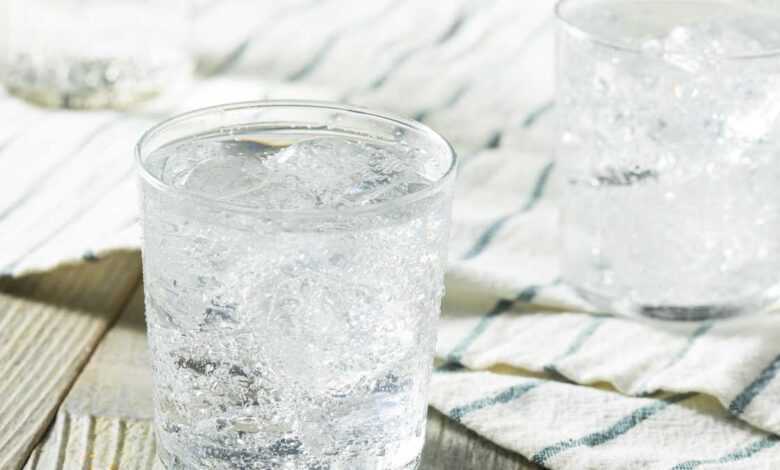
Is sparkling water good for you? Experts weigh in
Here's what to know about weight loss, your teeth and heart health when it comes to this fizzy drink.
Often hailed as a healthier alternative to soda, sparkling water has seen a huge surge in popularity in recent years, and that trend is only expected to keep growing. This bubbly drink is now available in every flavor imaginable, and you can even make your own at home. This is all happy news — sparkling water is a great way to stay hydrated, especially if you're bored with drinking plain water. "I’m here for sparkling water in its simplest form, which is without added sugar or artificial sweeteners, or masquerading as a 'healthy soda,'" said Jaclyn London, a registered dietician, nutrition consultant, podcast host and author of "Dressing on the Side (& Other Diet Myths Debunked)." "I think it’s great that we’ve now adopted this beverage category as more mainstream, and I love to see the innovation that’s happening," London said.But as more bubbly options fill the supermarket aisle, you may be wondering if it truly can replace still water and if it's bad for you in any way. We went straight to the experts to answer all of your sparkling water questions.What is sparkling water?According to Dr. Yezaz Ghouri, a gastroenterologist within the University of Missouri Health Care system, carbonated water is simply water (H2O) that's been infused with carbon dioxide gas (CO2) under high pressure. This process creates a "fizzy" drink that can come in several different forms, including seltzer, club soda, sparkling mineral water and tonic water. What differentiates these types of drinks depends on several factors, such as their carbonation methods, water sources and most importantly, added ingredients. The different types of carbonated water include club soda, seltzer, tonic water and mineral water. Some brands of sparkling water may contain extra additives to improve their taste, including sodium, artificial sweeteners and flavoring agents, so it's important to check the label before purchasing.Sparkling water health benefits There are plenty of reasons to sip on this fizzy beverage. When selecting a sparkling water, make sure to look for ones that are low in calories and sugar. Avoid options with high fructose corn syrup, sodium, or artificial flavorings and sweeteners like aspartame and sucralose. It's always smartest to opt for club soda, seltzer or sparkling mineral water over tonic water. Sparkling side effects"In my opinion, there are very few reasons to worry about drinking 'too much' sparkling water. I literally re-hydrate post-exercise with sparkling water, this is how much of a die-hard fan I am!" London said. "But, it’s really about personal tolerance, and it's always a good idea to mix it up with flat and bubbly water."Since sparkling water contains CO2 gas, the bubbles in this fizzy drink can cause burping and bloating symptoms, and Ghouri also points out that brands that contain artificial sweeteners may cause diarrhea and even alter your gut microbiome. Stay away from carbonated water if you suffer from gastrointestinal issues like irritable bowel syndrome, particularly if you experience diarrhea as a recurring symptom since this is dehydrating and will negate all your bubbly hydration effort.You may also be wondering if sparkling water can be harmful to dental health due to claims that the carbonation erodes tooth enamel. It's true that carbonated water is slightly more acidic than regular water, but the risk of messing up your pearly whites is still fairly low. "Is it a bit more damaging than regular water? Probably... because you are exposing your teeth to an acidic solution. But the risk is really minimal," Ghouri said, so don't let this overblown fear hold you back from enjoying seltzer's benefits. If you need a little more assurance, the American Dental Association even says that sparkling water is "generally fine" for your teeth, provided that there are no added sugars. And finally, what about all those sparkling waters marketed as "zero sugar" or "low sugar" alternatives to soda? If you're a good hydrator and want to enjoy one every now and then, that's probably OK, but don't get into the habit of relying on these products as a hydration tool, London said. "We're starting to see sugar alcohols or resistant starches added to some bubbly options, especially ones sold as 'prebiotic soda.' These are compounds derived from naturally-occurring foods (we find both of these in fruits and veggies ubiquitously in nature), but when they’re made for the purpose of adding fiber or sweetness to beverages, they can backfire big time," London said — so you may be left with tummy or bathroom troubles. Is sparkling water better than regular water?A glass of plain carbonated water is just as hydrating as regular water and can be a fantastic alternative to sugary sodas. "There isn't major evidence that plain sparkling water has harmful effects on your health. If you're ever in doubt, though, you can never go wrong with turning to the safest and healthiest choice: regular still water. "Water — just plain old water — is the best form of hydration," Ghouri said.The bottom line: You should always be mindful of any added ingredients in sparkling waters, especially sugar, artificial sweeteners and sodium, all of which can potentially have harmful effects on the body. "When choosing a sparkling water, check the label for 0g sugar to be sure you're choosing the most hydrating kind," London recommends.
Often hailed as a healthier alternative to soda, sparkling water has seen a huge surge in popularity in recent years, and that trend is only expected to keep growing. This bubbly drink is now available in every flavor imaginable, and you can even make your own at home. This is all happy news — sparkling water is a great way to stay hydrated, especially if you're bored with drinking plain water.
"I’m here for sparkling water in its simplest form, which is without added sugar or artificial sweeteners, or masquerading as a 'healthy soda,'" said Jaclyn London, a registered dietician, nutrition consultant, podcast host and author of "Dressing on the Side (& Other Diet Myths Debunked)."
"I think it’s great that we’ve now adopted this beverage category as more mainstream, and I love to see the innovation that’s happening," London said.
But as more bubbly options fill the supermarket aisle, you may be wondering if it truly can replace still water and if it's bad for you in any way. We went straight to the experts to answer all of your sparkling water questions.
What is sparkling water?
According to Dr. Yezaz Ghouri, a gastroenterologist within the University of Missouri Health Care system, carbonated water is simply water (H2O) that's been infused with carbon dioxide gas (CO2) under high pressure. This process creates a "fizzy" drink that can come in several different forms, including seltzer, club soda, sparkling mineral water and tonic water.
What differentiates these types of drinks depends on several factors, such as their carbonation methods, water sources and most importantly, added ingredients. The different types of carbonated water include club soda, seltzer, tonic water and mineral water.
Some brands of sparkling water may contain extra additives to improve their taste, including sodium, artificial sweeteners and flavoring agents, so it's important to check the label before purchasing.
Sparkling water health benefits
There are plenty of reasons to sip on this fizzy beverage.
When selecting a sparkling water, make sure to look for ones that are low in calories and sugar. Avoid options with high fructose corn syrup, sodium, or artificial flavorings and sweeteners like aspartame and sucralose. It's always smartest to opt for club soda, seltzer or sparkling mineral water over tonic water.
Sparkling side effects
"In my opinion, there are very few reasons to worry about drinking 'too much' sparkling water. I literally re-hydrate post-exercise with sparkling water, this is how much of a die-hard fan I am!" London said. "But, it’s really about personal tolerance, and it's always a good idea to mix it up with flat and bubbly water."
Since sparkling water contains CO2 gas, the bubbles in this fizzy drink can cause burping and bloating symptoms, and Ghouri also points out that brands that contain artificial sweeteners may cause diarrhea and even alter your gut microbiome. Stay away from carbonated water if you suffer from gastrointestinal issues like irritable bowel syndrome, particularly if you experience diarrhea as a recurring symptom since this is dehydrating and will negate all your bubbly hydration effort.
You may also be wondering if sparkling water can be harmful to dental health due to claims that the carbonation erodes tooth enamel. It's true that carbonated water is slightly more acidic than regular water, but the risk of messing up your pearly whites is still fairly low.
"Is it a bit more damaging than regular water? Probably... because you are exposing your teeth to an acidic solution. But the risk is really minimal," Ghouri said, so don't let this overblown fear hold you back from enjoying seltzer's benefits. If you need a little more assurance, the American Dental Association even says that sparkling water is "generally fine" for your teeth, provided that there are no added sugars.
And finally, what about all those sparkling waters marketed as "zero sugar" or "low sugar" alternatives to soda? If you're a good hydrator and want to enjoy one every now and then, that's probably OK, but don't get into the habit of relying on these products as a hydration tool, London said. "We're starting to see sugar alcohols or resistant starches added to some bubbly options, especially ones sold as 'prebiotic soda.' These are compounds derived from naturally-occurring foods (we find both of these in fruits and veggies ubiquitously in nature), but when they’re made for the purpose of adding fiber or sweetness to beverages, they can backfire big time," London said — so you may be left with tummy or bathroom troubles.
Is sparkling water better than regular water?
A glass of plain carbonated water is just as hydrating as regular water and can be a fantastic alternative to sugary sodas. "There isn't major evidence that plain sparkling water has harmful effects on your health. If you're ever in doubt, though, you can never go wrong with turning to the safest and healthiest choice: regular still water.
"Water — just plain old water — is the best form of hydration," Ghouri said.
The bottom line: You should always be mindful of any added ingredients in sparkling waters, especially sugar, artificial sweeteners and sodium, all of which can potentially have harmful effects on the body. "When choosing a sparkling water, check the label for 0g sugar to be sure you're choosing the most hydrating kind," London recommends.







